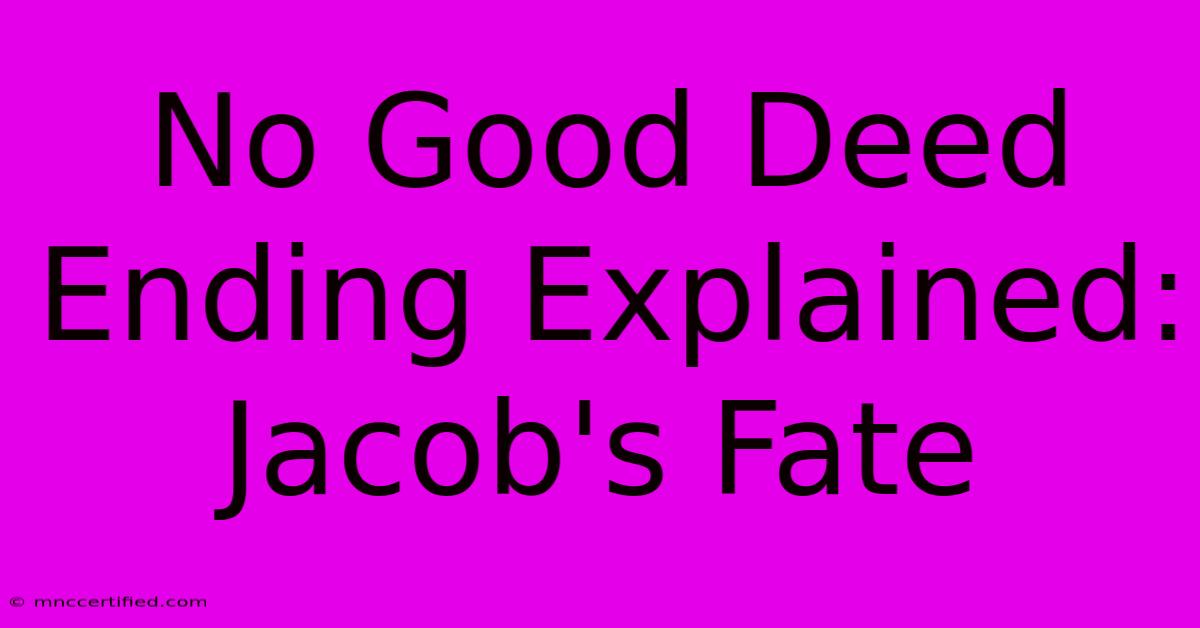No Good Deed Ending Explained: Jacob's Fate

Table of Contents
No Good Deed Ending Explained: Jacob's Fate and the Unraveling of a Twisted Narrative
The Netflix film, No Good Deed, leaves viewers reeling, not from jump scares, but from the chillingly realistic portrayal of a seemingly ordinary man's descent into terrifying manipulation. While the film's central mystery focuses on Colin’s sinister intentions, the ultimate fate of Jacob, the seemingly innocent son, is equally crucial to understanding the film's unsettling conclusion. This post will delve into a detailed explanation of the ending, focusing specifically on Jacob's fate and the broader implications of the narrative.
The Seeds of Doubt: Jacob's Troubled Behavior
Throughout No Good Deed, Jacob's behavior is presented as erratic and unsettling. While initially appearing to be a typical troubled teen, closer examination reveals a series of subtle cues hinting at a deeper, more sinister influence. His actions, often brushed off as typical teenage rebellion, gradually build a compelling case for his complicity in Colin's manipulative scheme. We see glimpses of his involvement, most notably in his interactions with Colin and his increasingly unnerving behavior towards his mother.
Was Jacob Manipulated or a Willing Participant?
This is the central question surrounding Jacob's role. The film skillfully avoids giving a clear-cut answer, leaving the audience to grapple with the ambiguity. Was Colin expertly manipulating Jacob, preying on his vulnerabilities and insecurities, or was Jacob a more willing participant, actively assisting in Colin's cruel plan? The film suggests a chilling blend of both.
-
Colin's Manipulation: Colin is a master manipulator, adept at using charm and psychological tactics to control those around him. His influence on Jacob is undeniable, and the film strongly suggests Colin groomed Jacob to be complicit. The subtle gestures and conversations between them highlight this insidious influence.
-
Jacob's Agency: However, the film also subtly shows Jacob’s own darker impulses. He displays moments of cruelty and indifference, suggesting he may not be as innocent as he initially appears. His actions are not simply reactions to Colin's manipulation; they seem to stem from his own character flaws, amplified and exploited by Colin.
The Final Confrontation and Jacob's Fate
The climax sees a tense confrontation between Tessa, Colin, and, implicitly, Jacob. While Jacob isn't directly involved in the physical struggle, his actions—or lack thereof—reveal the depth of his involvement. He remains silent, an observer, a silent accomplice. This absence of intervention speaks volumes.
The Ambiguity of the Ending: A Deliberate Choice
The film deliberately leaves Jacob's fate ambiguous. We don't see him punished or apprehended. His silence after the confrontation leaves the audience questioning his future and the long-term consequences of his actions. This ambiguity is a crucial element of the film's unsettling impact. It forces us to consider the lasting psychological damage and the possibility of future repercussions for both Jacob and Tessa.
Beyond Jacob: The Broader Themes of No Good Deed
Jacob's role is not simply a plot device; it serves to highlight the film's broader themes:
- The insidious nature of manipulation: The film demonstrates how manipulation can subtly erode the boundaries of trust and corrupt even seemingly innocent individuals.
- The complexity of human nature: Jacob's character challenges the notion of simple good and evil, highlighting the grey areas in human behavior.
- The lasting impact of trauma: The film explores the long-term psychological consequences of trauma, particularly for Jacob and Tessa.
The ambiguous fate of Jacob enhances the film's unsettling power, lingering in the viewer's mind long after the credits roll. It’s a testament to the film's masterful storytelling and its ability to evoke thought-provoking questions about human nature and the insidiousness of manipulative behavior. The lingering uncertainty surrounding Jacob ensures that No Good Deed stays with you, prompting continued reflection on its disturbingly realistic portrayal of evil.

Thank you for visiting our website wich cover about No Good Deed Ending Explained: Jacob's Fate. We hope the information provided has been useful to you. Feel free to contact us if you have any questions or need further assistance. See you next time and dont miss to bookmark.
Featured Posts
-
Vanderpump Rules Star James Kennedy Faces Arrest
Dec 13, 2024
-
The Witcher 4 Ciris Return Teased
Dec 13, 2024
-
Viktoria Plzen 0 2 Man Utd Hojlund Brace
Dec 13, 2024
-
Game Awards 2024 Astro Bot Triumphs
Dec 13, 2024
-
Vanderpump Rules Star Faces Domestic Arrest
Dec 13, 2024